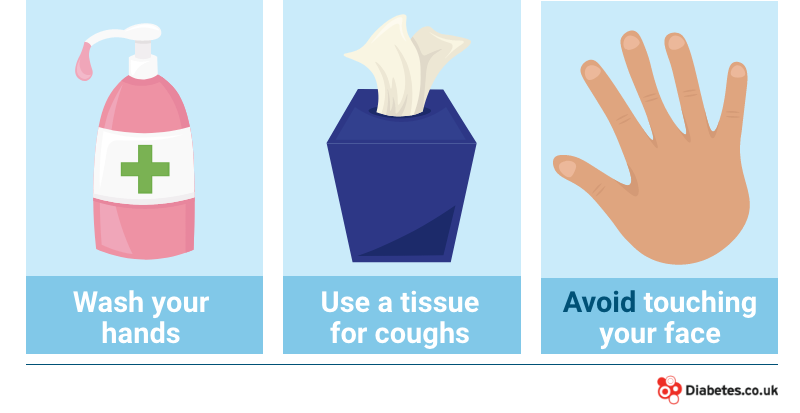If you think that you have contracted the virus, DO NOT go to your local pharmacy, GP surgery or Emergency Department or Minor Injuries Unit. Instead, you should visit the dedicated NHS 111 Coronavirus service at https://111.nhs.uk/covid-19
This page will be updated as events unfold and advice is provided by WHO/NHS/UK Government
It’s been impossible to avoid news of the coronavirus outbreak in recent weeks. Understandably, people may worry or feel uncertain about what the spread of the virus means for them or their loved ones. Times are uncertain, but please try not to worry. It’s not as bad as the media can sometimes make it out to be. Here’s more on a person with type 1 diabetes who recovered from coronavirus.
Coronaviruses are a large family of viruses which have been around for a long time and can cause illness. In humans, coronaviruses are known to cause respiratory infections from a common cold to more severe diseases.
The coronavirus disease COVID-19 that is currently in the news is caused by a newly discovered type of coronavirus. Prior to the outbreak in Wuhan, China in December 2019, this new virus and the disease were unknown.
Read more in the forum:
- COVID-19: comorbidity with diabetes
- Is everyone managing to eat usual foods?
- Coronavirus: how at risk am I?
- Self isolation for 12 weeks
Symptoms
The most common symptoms of COVID-19 include:
- Fever
- Tiredness
- Dry Cough
Some patients may have aches and pains, nasal congestion, runny nose, sore throat or diarrhoea. These symptoms are usually mild and begin gradually. Some people become infected but don’t develop any symptoms and don’t feel unwell.
What is the risk?
Current reports indicate that illness as a result of the virus is generally mild, especially for children and young adults. In the majority of cases, those who contract the virus recover from the disease without needing special treatment. This is believed to be approximately 80% of affected individuals.[1]
Older people, those with a compromised immune system and individuals with underlying medical problems like diabetes, high blood pressure, heart problems or being very overweight, are at an increased risk of developing a serious illness.
It is estimated that approximately 1 out of every 6 people who gets COVID-19 becomes seriously ill and develops difficulty breathing. People with a fever, cough and difficulty breathing should seek medical attention.[2]
Should I be worried?
It is quite normal to feel worried about how the COVID-19 outbreak affects us or the people around us.
However, it is important to remember that at present the risk of infection is low in those who have not travelled to affected areas and have not had contact with someone with the virus.
Read the story of a person with type 1 diabetes who fully recovered from COVID-19.
Coronavirus and diabetes
The prevention mechanisms outlined below are useful to reduce the risk of becoming infected and control the spread.
Diabetes can make you more susceptible to illness. It is one of the underlying conditions reported to be associated with the onset of more severe symptoms in individuals affected by the coronavirus.
However, there are steps to take to keep your blood glucose levels well controlled to help reduce your risk of becoming ill. Eating well, testing blood sugars regularly, reducing stress and getting plenty of sleep can help with blood sugar control.
Dan Howarth, head of care at Diabetes UK, said: “Coronavirus or Covid-19 can cause complications in people with diabetes.
“If you have diabetes and you have symptoms such as cough, high temperature and feeling short of breath, you need to monitor your blood sugar closely and call the NHS 111 phone service.”
Simple steps to lower your risk of contracting the virus
There are actions you can take to reduce your risk of contracting the virus and help limit the spread among communities.
1. Wash your hands regularly
It might sound simple, but regular hand washing is important as it can help kill any viruses that may be on your hands.
You should thoroughly wash your hands with soap and water for at least 20 seconds (handy tip – sing happy birthday to yourself twice whilst washing). Take notice of areas you might miss including the back of your hands, between your fingers and around the nails. Or use an alcohol-based hand rub. The NHS recommends ensuring you wash your hands when you get home or arrive at work.
2. Maintain a distance
Avoid close contact with people who are unwell. Keeping at least a 1-meter (3 feet) distance between yourself and anyone who is coughing/ sneezing is recommended by The World Health Organisation.
3. Practice good hygiene
Be sure to cover your mouth and nose when you cough or sneeze. You should not use your hands to do this. Covering your mouth and nose with a tissue or your bent elbow is more appropriate. It is important to dispose of used tissues immediately and thoroughly wash your hands afterwards.
4. Keep your hands away from your face
Our hands touch many surfaces and can transfer a virus from surfaces into your body. A simple step to minimise this risk is to avoid touching your eyes, nose or mouth if your hands are not clean.
5. Stay informed and follow official advice
The spread of the coronavirus is an ongoing situation. It is important to stay informed with the latest information and to protect yourself and others from COVID-19 following advice from your healthcare provider, your national and local public health authority.
Sources of information:
- https://www.who.int/news-room/q-a-detail/q-a-coronaviruses
- https://www.nhs.uk/conditions/coronavirus-covid-19/
- https://www.nhs.uk/conditions/coronavirus-covid-19/common-questions/
- https://www.gov.uk/government/publications/coronavirus-action-plan/coronavirus-action-plan-a-guide-to-what-you-can-expect-across-the-uk
If you have fever, cough and difficulty breathing, seek medical care early.
Follow the directions of your local health authority.
National and local authorities will have the most up to date information on the situation in your area. Calling in advance will allow your health care provider to quickly direct you to the right health facility. This will also protect you and help prevent the spread of viruses and other infections.
The spread of coronavirus is an ongoing situation. Information contained within this programme is in accordance with World Health Organisation and NHS guidelines at the time of publishing.




